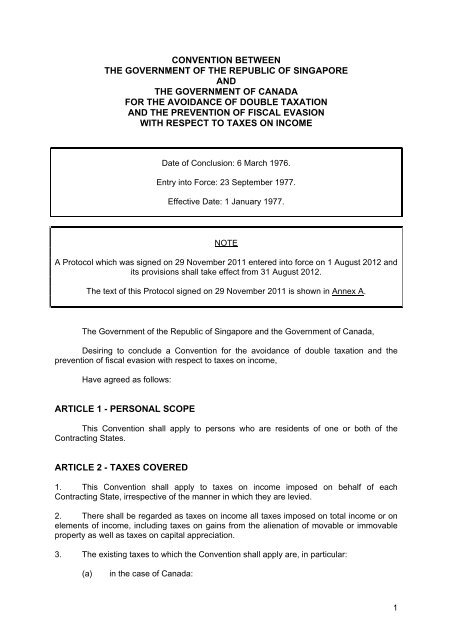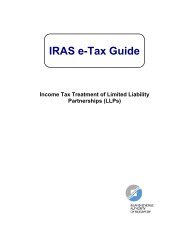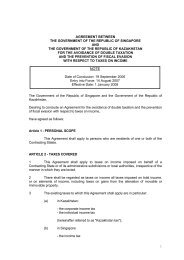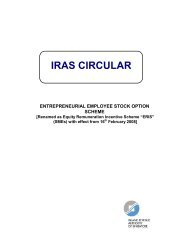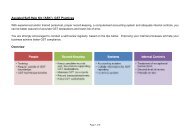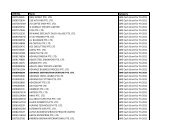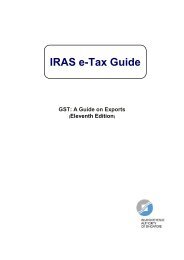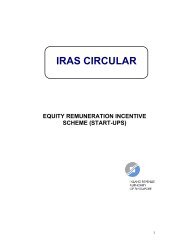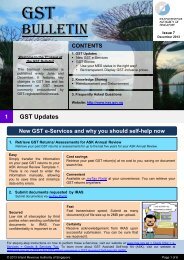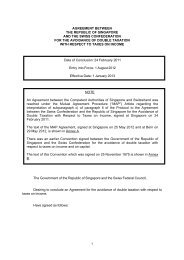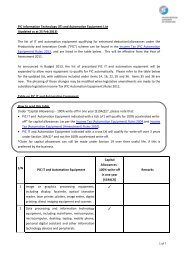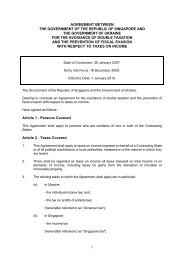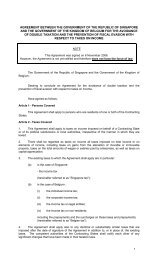Canada - IRAS
Canada - IRAS
Canada - IRAS
You also want an ePaper? Increase the reach of your titles
YUMPU automatically turns print PDFs into web optimized ePapers that Google loves.
CONVENTION BETWEEN<br />
THE GOVERNMENT OF THE REPUBLIC OF SINGAPORE<br />
AND<br />
THE GOVERNMENT OF CANADA<br />
FOR THE AVOIDANCE OF DOUBLE TAXATION<br />
AND THE PREVENTION OF FISCAL EVASION<br />
WITH RESPECT TO TAXES ON INCOME<br />
Date of Conclusion: 6 March 1976.<br />
Entry into Force: 23 September 1977.<br />
Effective Date: 1 January 1977.<br />
NOTE<br />
A Protocol which was signed on 29 November 2011 entered into force on 1 August 2012 and<br />
its provisions shall take effect from 31 August 2012.<br />
The text of this Protocol signed on 29 November 2011 is shown in Annex A.<br />
The Government of the Republic of Singapore and the Government of <strong>Canada</strong>,<br />
Desiring to conclude a Convention for the avoidance of double taxation and the<br />
prevention of fiscal evasion with respect to taxes on income,<br />
Have agreed as follows:<br />
ARTICLE 1 - PERSONAL SCOPE<br />
This Convention shall apply to persons who are residents of one or both of the<br />
Contracting States.<br />
ARTICLE 2 - TAXES COVERED<br />
1. This Convention shall apply to taxes on income imposed on behalf of each<br />
Contracting State, irrespective of the manner in which they are levied.<br />
2. There shall be regarded as taxes on income all taxes imposed on total income or on<br />
elements of income, including taxes on gains from the alienation of movable or immovable<br />
property as well as taxes on capital appreciation.<br />
3. The existing taxes to which the Convention shall apply are, in particular:<br />
(a)<br />
in the case of <strong>Canada</strong>:<br />
1
the income taxes imposed by the Government of <strong>Canada</strong><br />
(hereinafter referred to as "Canadian tax");<br />
(b)<br />
in the case of Singapore:<br />
the income tax<br />
(hereinafter referred to as "Singapore tax").<br />
4. The Convention shall apply also to any identical or substantially similar taxes which<br />
are imposed after the date of signature of this Convention in addition to, or in place of, the<br />
existing taxes. The Contracting States shall notify each other of any significant changes<br />
which have been made to their respective taxation laws.<br />
ARTICLE 3 - GENERAL DEFINITIONS<br />
1. In this Convention, unless the context otherwise requires:<br />
(a)<br />
(b)<br />
(c)<br />
(d)<br />
(e)<br />
(f)<br />
(g)<br />
(h)<br />
(i)<br />
the term "<strong>Canada</strong>" used in a geographical sense means the territory of<br />
<strong>Canada</strong>, including any area outside the territorial waters of <strong>Canada</strong> which<br />
under the laws of <strong>Canada</strong> is an area within which the rights of <strong>Canada</strong> with<br />
respect to the seabed and subsoil and their natural resources may be<br />
exercised;<br />
the term "Singapore" means the Republic of Singapore;<br />
the terms "a Contracting State" and " the other Contracting State" mean, as<br />
the context requires, <strong>Canada</strong> or Singapore;<br />
the term "person" includes an individual, a company, a partnership, an estate,<br />
a trust and any other body of persons which is treated as an entity for tax<br />
purposes;<br />
the term "company" means any body corporate or any other entity which is<br />
treated as a body corporate for tax purposes; in French, the term "société"<br />
also means a "corporation" within the meaning of Canadian law;<br />
the terms "enterprise of a Contracting State" and "enterprise of the other<br />
Contracting State" mean respectively an enterprise carried on by a resident of<br />
a Contracting State and an enterprise carried on by a resident of the other<br />
Contracting State;<br />
the term "competent authority" means in the case of <strong>Canada</strong>, the Minister of<br />
National Revenue or his authorized representative, and in the case of<br />
Singapore, the Minister for Finance or his authorized representative;<br />
the term "tax" means Canadian tax or Singapore tax as the context requires;<br />
the term "citizen" means:<br />
(i)<br />
any individual possessing the citizenship of a Contracting State;<br />
2
(ii)<br />
any legal person, partnership and association deriving its status as<br />
such from the law in force in a Contracting State.<br />
2. As regards the application of the Convention by a Contracting State any term not<br />
otherwise defined shall, unless the context otherwise requires, have the meaning which it<br />
has under the laws of the Contracting State relating to the taxes which are the subject of the<br />
Convention.<br />
ARTICLE 4 - FISCAL DOMICILE<br />
1. For the purposes of this Convention, the term "resident of a Contracting State"<br />
means any person who, under the law of the State, is liable to taxation therein by reason of<br />
his residence, place of management or any other criterion of a similar nature. It also includes<br />
a partnership, an estate or a trust but only to the extent that the income derived by such<br />
person is subject to tax in a Contracting State as the income of a person resident in that<br />
State.<br />
2. Where by reason of the provisions of paragraph 1 an individual is a resident of both<br />
Contracting States, his status shall be determined in accordance with the following rules:<br />
(a)<br />
(b)<br />
(c)<br />
he shall be deemed to be a resident of the Contracting State in which he has<br />
a permanent home available to him. If he has a permanent home available to<br />
him in both Contracting States, he shall be deemed to be a resident of the<br />
Contracting State with which his personal and economic relations are closest<br />
(hereinafter referred to as his "centre of vital interests");<br />
if the Contracting State in which he has his centre of vital interests cannot be<br />
determined or if he has not a permanent home available to him in either<br />
Contracting State, he shall be deemed to be a resident of the Contracting<br />
State in which he has an habitual abode;<br />
if he has an habitual abode in both Contracting States or in neither of them,<br />
the competent authorities of the Contracting States shall settle the question<br />
by mutual agreement.<br />
3. Where by reason of the provisions of paragraph 1 a person other than an individual is<br />
a resident of both Contracting States, the competent authorities of the Contracting States<br />
shall by mutual agreement endeavour to settle the question and to determine the mode of<br />
application of the Convention to such person.<br />
ARTICLE 5 - PERMANENT ESTABLISHMENT<br />
1. For the purposes of this Convention, the term "permanent establishment" means a<br />
fixed place of business in which the business of the enterprise is wholly or partly carried on.<br />
2. The term "permanent establishment" shall include especially:<br />
(a)<br />
(b)<br />
(c)<br />
a place of management;<br />
a branch;<br />
an office;<br />
3
(d)<br />
(e)<br />
(f)<br />
(g)<br />
(h)<br />
a factory;<br />
a workshop;<br />
a mine, quarry or other place of extraction of natural resources;<br />
a farm or plantation;<br />
a building site or construction or assembly project which exists for more than<br />
six months.<br />
3. The term "permanent establishment" shall not be deemed to include:<br />
(a)<br />
(b)<br />
(c)<br />
(d)<br />
(e)<br />
the use of facilities solely for the purpose of storage, display or delivery of<br />
goods or merchandise belonging to the enterprise;<br />
the maintenance of a stock of goods or merchandise belonging to the<br />
enterprise solely for the purpose of storage, display or delivery;<br />
the maintenance of a stock of goods or merchandise belonging to the<br />
enterprise solely for the purpose of processing by another enterprise;<br />
the maintenance of a fixed place of business solely for the purpose of<br />
purchasing goods or merchandise, or for collecting information, for the<br />
enterprise;<br />
the maintenance of a fixed place of business solely for the purpose of<br />
advertising, for the supply of information, for scientific research, or for similar<br />
activities which have a preparatory or auxiliary character, for the enterprise.<br />
4. An enterprise of a Contracting State shall be deemed to have a permanent<br />
establishment in the other Contracting State if it carries on supervisory activities in that other<br />
Contracting State for more than six months in connection with a building site, construction,<br />
installation or assembly project which is being undertaken in that other Contracting State.<br />
5. A person - other than an agent of an independent status to whom paragraph 6<br />
applies - acting in a Contracting State on behalf of an enterprise of the other Contracting<br />
State shall be deemed to be a permanent establishment in the first-mentioned Contracting<br />
State if:<br />
(a)<br />
(b)<br />
he has, and habitually exercises in that first-mentioned Contracting State, an<br />
authority to conclude contracts in the name of the enterprise, unless his<br />
activities are limited to the purchase of goods or merchandise for the<br />
enterprise; or<br />
he maintains in the first-mentioned Contracting State a stock of goods or<br />
merchandise belonging to the enterprise from which he regularly fills orders<br />
on behalf of the enterprise.<br />
6. An enterprise of a Contracting State shall not be deemed to have a permanent<br />
establishment in the other Contracting State merely because it carries on business in that<br />
other State through a broker, general commission agent or any other agent of an<br />
independent status, where such persons are acting in the ordinary course of their business.<br />
4
7. The fact that a company which is a resident of a Contracting State controls or is<br />
controlled by a company which is a resident of the other Contracting State, or which carries<br />
on business in that other State (whether through a permanent establishment or otherwise),<br />
shall not of itself constitute either company a permanent establishment of the other.<br />
ARTICLE 6 - INCOME FROM IMMOVABLE PROPERTY<br />
1. Income from immovable property including income from agriculture or forestry may<br />
be taxed in the Contracting State in which such property is situated.<br />
2. The term "immovable property" shall be defined in accordance with the law of the<br />
Contracting State in which the property in question is situated. The term shall in any case<br />
include property accessory to immovable property, livestock and equipment used in<br />
agriculture and forestry, rights to which the provisions of general law respecting landed<br />
property apply, usufruct of immovable property and rights to variable or fixed payments as<br />
consideration for the working of, or the right to work, mineral deposits, sources and other<br />
natural resources; ships and aircraft shall not be regarded as immovable property.<br />
3. The provisions of paragraph 1 shall also apply to income derived from the direct use,<br />
letting, or use in any other form of immovable property and to profits from the alienation of<br />
such property.<br />
4. The provisions of paragraphs 1 and 3 shall also apply to the income from immovable<br />
property of an enterprise and to income from immovable property used for the performance<br />
of professional services.<br />
ARTICLE 7 - BUSINESS PROFITS<br />
1. The profits of an enterprise of a Contracting State shall be taxable only in that State<br />
unless the enterprise carries on or has carried on business in the other Contracting State<br />
through a permanent establishment situated therein. If the enterprise carries on or has<br />
carried on business as aforesaid, the profits of the enterprise may be taxed in the other State<br />
but only so much of them as is attributable to that permanent establishment.<br />
2. Subject to the provisions of paragraph 3, where an enterprise of a Contracting State<br />
carries on or has carried on business in the other Contracting State through a permanent<br />
establishment situated therein, there shall be attributed to that permanent establishment<br />
profits which it might be expected to make if it were a distinct and separate enterprise<br />
engaged in the same or similar activities under the same or similar conditions and dealing<br />
wholly independently with the enterprise of which it is a permanent establishment.<br />
3. In the determination of the profits of a permanent establishment, there shall be<br />
allowed those deductible expenses, including executive and general administrative<br />
expenses, which are incurred for the purposes of the permanent establishment in so far as<br />
they are reasonably allocable to the permanent establishment, whether incurred in the State<br />
in which the permanent establishment is situated or elsewhere.<br />
4. No profits shall be attributed to a permanent establishment by reason of the mere<br />
purchase by that permanent establishment of goods or merchandise for the enterprise.<br />
5
5. Where profits include items of income which are dealt with separately in other<br />
Articles of this Convention, then the provisions of those Articles shall not be affected by the<br />
provisions of this Article.<br />
ARTICLE 8 - SHIPPING AND AIR TRANSPORT<br />
1. Profits derived by an enterprise of a Contracting State from the operation of ships or<br />
aircraft in international traffic shall be taxable only in that State.<br />
2. Notwithstanding the provisions of Article 7 or of paragraph 1 of this Article, profits<br />
derived from the operation of ships or aircraft used principally to transport goods or<br />
passengers exclusively between places in a Contracting State may be taxed in that State.<br />
3. The provisions of this Article shall also apply to profits referred to in this Article<br />
derived by an enterprise of a Contracting State from its participation in a pool, a joint<br />
business or in an international operating agency.<br />
ARTICLE 9 - ASSOCIATED ENTERPRISES<br />
Where -<br />
(a)<br />
(b)<br />
an enterprise of a Contracting State participates directly or indirectly in the<br />
management, control or capital of an enterprise of the other Contracting<br />
State, or<br />
the same persons participate directly or indirectly in the management, control<br />
or capital of an enterprise of a Contracting State and an enterprise of the<br />
other Contracting State,<br />
and in either case conditions are made or imposed between the two enterprises in their<br />
commercial or financial relations which differ from those which would be made between<br />
independent enterprises, then any profits which would, but for those conditions, have<br />
accrued to one of the enterprises, but, by reason of those conditions, have not so accrued,<br />
may be included in the profits of that enterprise an taxed accordingly.<br />
ARTICLE 10 - DIVIDENDS<br />
1. Dividends paid by a company which is a resident of a Contracting State to a resident<br />
of the other Contracting State may be taxed in that other State.<br />
2. However, such dividends may be taxed in the Contracting State of which the<br />
company paying the dividends is a resident, and according to the law of that State; but<br />
where the resident of the other Contracting State is the beneficial owner of the dividends,<br />
then, subject to the provisions of Article 21 of this Convention, the tax so charged shall not<br />
exceed 15 per cent of the gross amount of the dividends. The provisions of this paragraph<br />
shall not affect the taxation of the company on the profits out of which the dividends are paid.<br />
3. Notwithstanding the provisions of paragraph 2, as long as Singapore does not<br />
impose a tax on dividends in addition to the tax chargeable on the profits or income of a<br />
company, dividends paid by a company which is a resident of Singapore to a resident of<br />
<strong>Canada</strong> shall be exempt from any tax in Singapore which may be chargeable on dividends in<br />
6
addition to the tax chargeable on the profits or income of the company. Provided that nothing<br />
in this paragraph shall affect the provisions of Singapore law under which the tax in respect<br />
of a dividend paid by a company which is a resident of Singapore from which Singapore tax<br />
has been, or has been deemed to be, deducted may be adjusted by reference to the rate of<br />
tax appropriate to the Singapore year of assessment immediately following that in which the<br />
dividend was paid.<br />
4. The term "dividends" as used in this Article means income from shares, mining<br />
shares, founders' shares or other rights, not being debt-claims, participating in profits, as<br />
well as income assimilated to income from shares by the taxation law of the State of which<br />
the company making the distribution is a resident.<br />
5. The provisions of paragraphs 2 and 3 shall not apply if the recipient of the dividends,<br />
being a resident of a Contracting State, carries on in the other Contracting State of which the<br />
company paying the dividends is a resident, a trade or business through a permanent<br />
establishment situated therein, and the holding by virtue of which the dividends are paid is<br />
effectively connected with such permanent establishment. In such a case, the provisions of<br />
Article 7 shall apply.<br />
6. Where a company is a resident of only one Contracting State, the other Contracting<br />
State may not impose any tax on the dividends paid by the company to persons who are not<br />
residents of that other State, or subject the company to a tax on undistributed profits, even if<br />
the dividends paid or the undistributed profits consist wholly or partly of profits or income<br />
arising in such other State. The provisions of this paragraph shall not prevent that other<br />
State from taxing dividends relating to a holding which is effectively connected with a<br />
permanent establishment operated in that other State by a person who is not a resident of<br />
that other State.<br />
7. Nothing in this Convention shall be construed as preventing <strong>Canada</strong> from imposing<br />
on the earnings of a company attributable to a permanent establishment in <strong>Canada</strong>, tax in<br />
addition to the tax which would be chargeable on the earnings of a company which is<br />
incorporated in <strong>Canada</strong>, provided that any additional tax so imposed shall not exceed 15 per<br />
cent of the amount of such earnings which have not been subjected to such additional tax in<br />
previous taxation years. For the purpose of this provision, the term "earnings" means the<br />
profits attributable to a permanent establishment in <strong>Canada</strong> in a year and previous years<br />
after deducting therefrom all taxes, other than the additional tax referred to herein, imposed<br />
on such profits in <strong>Canada</strong>.<br />
8. For the purposes of this Convention dividends paid by a Malaysian company out of<br />
profits derived from sources in Singapore and deemed to be dividends from sources in<br />
Singapore in accordance with the Agreement for the Avoidance of Double Taxation with<br />
respect to taxes on income between the Government of the Republic of Singapore and the<br />
Government of Malaysia signed on the 26th day of December, 1968 shall be treated as<br />
dividends paid by a company which is a resident in Singapore.<br />
ARTICLE 11 - INTEREST<br />
1. Interest arising in a Contracting State and paid to a resident of the other Contracting<br />
State may be taxed in that other State.<br />
2. However, such interest may be taxed in the Contracting State in which it arises, and<br />
according to the law of that State; but the tax so charged shall, provided that the interest is<br />
taxable in the other Contracting State, not exceed 15 per cent of the gross amount of the<br />
interest.<br />
7
3. The term "interest" as used in this Article means income from debt-claims of every<br />
kind, whether or not secured by mortgage, and whether or not carrying a right to participate<br />
in the debtor's profits, and in particular, income from government securities and income from<br />
bonds or debentures, including premiums and prizes attaching to such securities, bonds or<br />
debentures, as well as income assimilated to income from money lent by the taxation law of<br />
the State in which the income arises. However, the term "interest" does not include income<br />
dealt with in Article 10.<br />
4. The provisions of paragraph 2 shall not apply if the recipient of the interest, being a<br />
resident of a Contracting State, carries on in the other Contracting State in which the interest<br />
arises a trade or business through a permanent establishment situated therein and the debtclaim<br />
in respect of which the interest is paid is effectively connected with such permanent<br />
establishment. In such a case, the provisions of Article 7 shall apply.<br />
5. Interest shall be deemed to arise in a Contracting State when the payer is that State<br />
itself, a political subdivision, a local authority or a resident of that State. Where, however, the<br />
person paying the interest, whether he is a resident of a Contracting State or not, has in a<br />
Contracting State a permanent establishment in connection with which the indebtedness on<br />
which the interest is paid was incurred, and such interest is borne by that permanent<br />
establishment, then such interest shall be deemed to arise in the Contracting State in which<br />
the permanent establishment is situated.<br />
6. Where, owing to a special relationship between the payer and the recipient or<br />
between both of them and some other person, the amount of the interest paid, having regard<br />
to the debt-claim for which it is paid, exceeds the amount which would have been agreed<br />
upon by the payer and the recipient in the absence of such relationship, the provisions of this<br />
Article shall apply only to the last-mentioned amount. In that case, the excess part of the<br />
payments shall remain taxable according to the law of each Contracting State, due regard<br />
being had to the other provisions of this Convention.<br />
7. Notwithstanding the provisions of paragraph 2, interest arising in Singapore and paid<br />
to the Export Development Corporation of <strong>Canada</strong> shall be exempt from tax in Singapore.<br />
ARTICLE 12 - ROYALTIES<br />
1. Royalties arising in a Contracting State and paid to a resident of the other<br />
Contracting State may be taxed in that other State.<br />
2. However, such royalties may be taxed in the Contracting State in which they arise,<br />
and according to the law of that State; but the tax so charged shall, provided that the<br />
royalties are taxable in the other Contracting State, not exceed 15 per cent of the gross<br />
amount of the royalties.<br />
3. The term "royalties" as used in this Article means payments of any kind received as a<br />
consideration for the use of, or the right to use, any copy right of literary, artistic or scientific<br />
work including cinematograph films, any patent, trade mark, design or model, plan, secret<br />
formula or process, or for the use of, or the right to use, industrial, commercial, or scientific<br />
equipment, or for information concerning industrial, commercial or scientific experience.<br />
4. The provisions of paragraph 2 shall not apply if the recipient of the royalties, being a<br />
resident of a Contracting State, carries on in the other Contracting State in which the<br />
royalties arise a trade or business through a permanent establishment situated therein and<br />
8
the right or property in respect of which the royalties are paid is effectively connected with<br />
such permanent establishment. In such a case, the provisions of Article 7 shall apply.<br />
5. Royalties shall be deemed to arise in a Contracting State when the payer is that<br />
State itself, a political subdivision, a local authority or a resident of that State. Where,<br />
however, the person paying the royalties, whether he is a resident of a Contracting State or<br />
not, has in a Contracting State a permanent establishment in connection with which the<br />
obligation to pay the royalties was incurred, and those royalties are borne by that permanent<br />
establishment, then such royalties shall be deemed to arise in the Contracting State in which<br />
the permanent establishment is situated.<br />
6. Where, owing to a special relationship between the payer and the recipient or<br />
between both of them and some other person, the amount of the royalties paid, having<br />
regard to the use, right or information for which they are paid, exceeds the amount which<br />
would have been agreed upon by the payer and the recipient in the absence of such<br />
relationship, the provisions of this Article shall apply only to the last-mentioned amount. In<br />
that case, the excess part of the payments shall remain taxable according to the law of each<br />
Contracting State, due regard being had to the other provisions of this Convention.<br />
ARTICLE 13 - GAINS FROM THE ALIENATION OF PROPERTY<br />
1. Gains from the alienation of immovable property, as defined in paragraph 2 of Article<br />
6, may be taxed in the Contracting State in which such property is situated.<br />
2. Gains from the alienation of movable property forming part of the business property<br />
of a permanent establishment which an enterprise of a Contracting State has in the other<br />
Contracting State or of movable property pertaining to a resident of a Contracting State in<br />
the other Contracting State for the purpose of performing professional services, including<br />
such gains from the alienation of such a permanent establishment (alone or together with the<br />
whole enterprise) may be taxed in the other State. However, gains from the alienation of<br />
ships and aircraft operated in international traffic and movable property pertaining to the<br />
operation of such ships or aircraft by an enterprise of a Contracting State shall be taxable<br />
only in that State.<br />
3. Gains from the alienation of shares of a company, or of an interest in a partnership or<br />
a trust, the property of which consists principally of immovable property as defined in<br />
paragraph 2 of Article 6, may be taxed in the Contracting State in which such immovable<br />
property is situated.<br />
4. Gains from the alienation of any property, other than those mentioned in paragraphs<br />
1, 2 and 3, shall be taxable only in the Contracting State of which the alienator is a resident.<br />
5. The provisions of paragraph 4 shall not affect the right of either of the Contracting<br />
States to levy, according to its domestic law, a tax on gains from the alienation of any<br />
property derived by an individual who is a resident of the other Contracting State and has<br />
been a resident of the first-mentioned State at any time during the six years immediately<br />
preceding the alienation of the property.<br />
ARTICLE 14 - PERSONAL SERVICES<br />
1. Subject to the provisions of Article 15, 17 and 18, salaries, wages and other similar<br />
remuneration or income for personal (including professional) services derived by a resident<br />
9
of a Contracting State, shall be taxable only in that Contracting State, unless the services<br />
are performed in the other Contracting State. If the services are so performed, such<br />
remuneration or income as is derived there from may be taxed in that other Contracting<br />
State.<br />
2. Notwithstanding the provisions of paragraph 1, remuneration or income derived by a<br />
resident of a Contracting State for personal (including professional) services performed in<br />
the other Contracting State shall be taxable only in the first-mentioned Contracting State if:<br />
(a)<br />
(b)<br />
(c)<br />
the recipient is present in the other Contracting State for a period or periods<br />
not exceeding in the aggregate 183 days in the calendar year concerned; and<br />
the remuneration or income is paid by, or on behalf of, a person who is a<br />
resident of the first-mentioned Contracting State; and<br />
the remuneration or income is not borne directly or indirectly by a permanent<br />
establishment which that person has in the other Contracting State.<br />
3. Notwithstanding the preceding provisions of this Article, remuneration derived by a<br />
resident of a Contracting State in respect of an employment exercised aboard a ship or<br />
aircraft in international traffic shall be exempt from tax in the other Contracting State.<br />
ARTICLE 15 - DIRECTORS' FEES<br />
Directors' fees and similar payments derived by a resident of a Contracting State in<br />
his capacity as a member of the Board of directors or a similar organ of a company which is<br />
a resident of the other Contracting State, may be taxed in that other State.<br />
ARTICLE 16 - ARTISTES AND ATHLETES<br />
1. Notwithstanding the provisions of Article 14, income derived by entertainers, such as<br />
theatre, motion picture, radio or television artistes, and musicians, and by athletes, from their<br />
personal activities as such may be taxed in the Contracting State in which these activities<br />
are performed.<br />
2. The provisions of paragraph 1 shall not apply to remuneration or profits, salaries,<br />
wages and similar income derived from activities performed in a Contracting State by<br />
entertainers and athletes if the visit to that Contracting State is substantially supported by<br />
public funds of the other Contracting State, including any political subdivision, local authority<br />
or statutory body thereof, nor to remuneration or profits, salaries, wages and similar income<br />
derived by entertainers and athletes in respect of services provided to a non-profit<br />
organization no part of the income of which was payable to, or was otherwise available for<br />
the personal benefit of, any proprietor, member or shareholder thereof.<br />
3. Notwithstanding the provisions of Article 7, where the activities mentioned in<br />
paragraph 1 of this Article are provided in a Contracting State by an enterprise of the other<br />
Contracting State the profits derived from providing these activities by such an enterprise<br />
may be taxed in the first-mentioned Contracting State unless the enterprise is substantially<br />
supported from the public funds of the other Contracting State, including any political<br />
subdivision, local authority or statutory body thereof, in connection with the provision of such<br />
activities, or unless the enterprise is a non-profit organization referred to in paragraph 2.<br />
10
ARTICLE 17 - PENSIONS AND ANNUITIES<br />
State.<br />
Pensions and annuities arising in a Contracting State shall be taxable only in that<br />
ARTICLE 18 - GOVERNMENTAL FUNCTIONS<br />
1. (a) Remuneration, other than a pension, paid by a Contracting State or a political<br />
subdivision or local authority thereof to any individual in respect of services<br />
rendered to that State or political subdivision or local authority thereof in the<br />
discharge of functions of a governmental nature shall be taxable only in that<br />
State.<br />
(b)<br />
However, such remuneration shall be taxable only in the Contracting State of<br />
which the recipient is a resident if the services are rendered in that State and<br />
the recipient did not become a resident of that State solely for the purpose of<br />
performing the services.<br />
2. The provisions of paragraph 1 shall not apply to remuneration in respect of services<br />
rendered in connection with any trade or business carried on by one of the Contracting<br />
States or a political subdivision or a local authority thereof.<br />
ARTICLE 19 - STUDENTS<br />
Payments which a student, apprentice or business trainee who is, or was<br />
immediately before visiting one of the Contracting States, a resident of the other Contracting<br />
State and who is present in the first-mentioned Contracting State solely for the purpose of<br />
his education or training, receives for the purpose of his maintenance, education or training<br />
shall not be taxed in that first-mentioned State, provided that such payments are made to<br />
him from sources outside that State.<br />
ARTICLE 20 - INCOME NOT EXPRESSLY MENTIONED<br />
1. Subject to the provisions of paragraph 2 of this Article, items of income of a resident<br />
of a Contracting State which are not expressly mentioned in the foregoing Articles of this<br />
Convention shall be taxable only in that Contracting State.<br />
2. However, if such income is derived by a resident of a Contracting State from sources<br />
in the other Contracting State, such income may also be taxed in the State in which it arises,<br />
and according to the law of that State.<br />
3. Notwithstanding the provisions of paragraph 2, in the case of alimony or maintenance<br />
payments and in the case of income of or from an estate or trust derived from sources in<br />
<strong>Canada</strong> by a resident of Singapore who is subject to tax in respect thereof, the tax charged<br />
in <strong>Canada</strong> shall not exceed 15 per cent of the gross amount of the payments or the income,<br />
as the case may be.<br />
11
ARTICLE 21 - LIMITATION OF RELIEF<br />
Where this Convention provides (with or without other conditions) that income from<br />
sources in a Contracting State shall be exempt from tax, or taxed at a reduced rate in that<br />
Contracting State and under the laws in force in the other Contracting State the said income<br />
is subject to tax by reference to the amount there of which is remitted to or received in that<br />
other Contracting State and not by reference to the full amount thereof, then the exemption<br />
or reduction of tax to be allowed under this Convention in the first-mentioned Contracting<br />
State shall apply to so much of the income as is remitted to or received in that other<br />
Contracting State.<br />
ARTICLE 22 - ELIMINATION OF DOUBLE TAXATION<br />
1. The laws in force in either of the Contracting States shall continue to govern the<br />
taxation of income in the respective Contracting States except where express provisions to<br />
the contrary is made in this Convention. Where income is subject to tax in both Contracting<br />
States, relief from double taxation shall be given in accordance with the following paragraphs<br />
of this Article.<br />
2. In the case of <strong>Canada</strong>, double taxation shall be avoided as follows:<br />
(a)<br />
(b)<br />
Subject to the existing provisions of the law of <strong>Canada</strong> regarding the<br />
allowance as a credit against Canadian tax of tax payable in any country<br />
other than <strong>Canada</strong> and to any subsequent modifications of those provisions -<br />
which shall not affect the general principle hereof - and unless a greater<br />
deduction or relief is provided under the laws of <strong>Canada</strong>, tax payable in<br />
Singapore on profits, income or gains arising in Singapore shall be allowed as<br />
a credit against Canadian tax payable in respect of such profits, income or<br />
gains.<br />
Subject to the existing provisions of the law of <strong>Canada</strong> regarding the<br />
determination of the exempt surplus of a foreign affiliate and to any<br />
subsequent modifications of those provisions -- which shall not affect the<br />
general principle hereof -- for the purpose of computing Canadian tax a<br />
company resident in <strong>Canada</strong> shall be allowed to deduct in computing its<br />
taxable income any dividend received by it out of the exempt surplus of a<br />
foreign affiliate resident in Singapore.<br />
3. In the case of Singapore, subject to the existing provisions of the law of Singapore<br />
regarding the allowance as a credit against Singapore tax of tax payable in any country other<br />
than Singapore and to any subsequent modifications of those provisions - which shall not<br />
affect the general principle hereof - tax payable in <strong>Canada</strong> on profits, income or gains arising<br />
in <strong>Canada</strong> shall be allowed as a credit against Singapore tax payable in respect of such<br />
profits, income or gains.<br />
4. For the purposes of paragraph 2 of this Article, tax payable in Singapore shall be<br />
deemed to include Singapore tax which would have been paid if the Singapore tax had not<br />
been exempted in accordance with the provisions of Part VI of the Economic Expansion<br />
Incentives (Relief from Income Tax) Act (1970 Edition) of Singapore, so far as they were in<br />
force on, and have not been modified since, the date of the signature of this Convention, or<br />
have been modified only in minor respects so as not to affect their general character.<br />
12
ARTICLE 23 - NON-DISCRIMINATION<br />
1. The citizens of a Contracting State shall not be subjected in the other Contracting<br />
State to any taxation or any requirements connected therewith which are other or more<br />
burdensome than the taxation and connected requirements to which citizens of that other<br />
State in the same circumstances are or may be subjected.<br />
2. The taxation on a permanent establishment which an enterprise of a Contracting<br />
State has in the other Contracting State shall not be less favourably levied in that other State<br />
than the taxation levied on enterprises of that other State carrying on the same activities.<br />
3. Nothing in this Article shall be construed as obliging:<br />
(a)<br />
(b)<br />
a Contracting State to grant to residents of the other Contracting State any<br />
personal allowances, reliefs and reductions for tax purposes which it grants to<br />
its own residents;<br />
Singapore to grant to citizens of <strong>Canada</strong> not resident in Singapore those<br />
personal allowances, reliefs and reductions for tax purposes which are by law<br />
available on the date of signature of this Convention only to citizens of<br />
Singapore whether or not they are resident in Singapore.<br />
4. In this Article, the term "taxation" means taxes which are the subject of this<br />
Convention.<br />
ARTICLE 24 - MUTUAL AGREEMENT PROCEDURE<br />
1. Where a resident of a Contracting State considers that the actions of one or both of<br />
the Contracting States result or will result for him in taxation not in accordance with this<br />
Convention, he may, without prejudice to the remedies provided by the national laws of<br />
those States, address to the competent authority of the Contracting State of which he is a<br />
resident an application in writing stating the grounds for claiming the revision of such<br />
taxation. To be admissible, the said application must be submitted within two years from the<br />
first notification of the action which gives rise to taxation not in accordance with the<br />
Convention.<br />
2. The competent authority referred to in paragraph 1 shall endeavour, if the objection<br />
appears to it to be justified and if it is not itself able to arrive at an appropriate solution, to<br />
resolve the case by mutual agreement with the competent authority of the other Contracting<br />
State, with a view to the avoidance of taxation not in accordance with the Convention.<br />
3. The competent authorities of the Contracting States shall endeavour to resolve by<br />
mutual agreement any difficulties or doubts arising as to the interpretation or application of<br />
the Convention.<br />
4. The competent authorities of the Contracting States may communicate with each<br />
other directly for the purpose of applying this Convention.<br />
ARTICLE 25 - EXCHANGE OF INFORMATION<br />
1. The competent authorities of the Contracting States shall exchange such information<br />
as is necessary for the carrying out of this Convention and of the domestic laws of the<br />
13
Contracting States concerning taxes covered by this Convention insofar as the taxation<br />
thereunder is in accordance with this Convention. Any information so exchanged shall be<br />
treated as secret and shall not be disclosed to any persons or authorities other than those<br />
concerned with the assessment or collection of the taxes which are the subject of this<br />
Convention.<br />
2. In no case shall the provisions of paragraph 1 be construed so as to impose on one<br />
of the Contracting States the obligation:<br />
(a)<br />
(b)<br />
(c)<br />
to carry out administrative measures at variance with the laws or the<br />
administrative practice of that or of the other Contracting State;<br />
to supply particulars which are not obtainable under the laws or in the normal<br />
course of the administration of that or of the other Contracting State;<br />
to supply information which would disclose any trade, business, industrial,<br />
commercial or professional secret or trade process, or information, the<br />
disclosure of which would be contrary to public policy (ordre public).<br />
ARTICLE 26 - DIPLOMATIC AND CONSULAR OFFICIALS<br />
1. Nothing in this Convention shall affect the fiscal privileges of members of diplomatic<br />
or consular missions under the general rules of international law or under the provisions of<br />
special agreements.<br />
2. Notwithstanding Article 4 of this Convention, an individual who is a member of a<br />
diplomatic, consular or permanent mission of a Contracting State which is situated in the<br />
other Contracting State or in a third State shall be deemed for the purposes of this<br />
Convention to be a resident of the sending State if he is taxed in that State as a resident in<br />
respect of taxes on income.<br />
3. This Convention shall not apply to International Organizations, to organs or officials<br />
thereof and to persons who are members of a diplomatic, consular or permanent mission of<br />
a third State, being present in a Contracting State and not being taxed in either Contracting<br />
State as a resident in respect of taxes on income.<br />
ARTICLE 27 - ENTRY INTO FORCE<br />
Each of the Contracting State shall take all measures necessary to give this<br />
Convention the force of law within jurisdiction and each shall notify the other of the<br />
completion of such measures. This Convention shall enter into force on the date on which<br />
the later notification is made and shall thereupon have effect:<br />
(a)<br />
in Singapore:<br />
in respect of tax for years of assessment beginning on or after the first day of<br />
January in the calendar year following that in which the exchange of<br />
notifications has been completed;<br />
(b)<br />
in <strong>Canada</strong>:<br />
(i)<br />
in respect of tax withheld at the source on amounts paid or credited to<br />
14
non-residents on or after the first day of January in the calendar year<br />
in which the exchange of notifications has been completed; and<br />
(ii)<br />
in respect of other Canadian tax for taxation years beginning on or<br />
after the first day of January in the calendar year in which the<br />
exchange of notifications has been completed.<br />
ARTICLE 28 - TERMINATION<br />
This Convention shall continue in effect indefinitely but either Contracting State may,<br />
on or before June 30 in any calendar year after the year 1975, give notice of termination to<br />
the other Contracting State and in such event the Convention shall cease to have effect:<br />
(a)<br />
in Singapore:<br />
in respect of tax for years of assessment beginning on or after the first day of<br />
January in the calendar year next following that in which the notice is given;<br />
(b)<br />
in <strong>Canada</strong>:<br />
(i)<br />
(ii)<br />
in respect of tax withheld at the source on amounts paid or credited to<br />
non-residents on or after the first day of January in the calendar year<br />
next following that in which the notice is given; and<br />
in respect of other Canadian tax for taxation years beginning on or<br />
after the first day of January in the calendar year next following that in<br />
which the notice is given.<br />
IN WITNESS WHEREOF the undersigned, duly authorised thereto, have signed this<br />
Convention.<br />
Done in Singapore, this 6th day of March of the year one thousand nine hundred and<br />
seventy-six in duplicate in the English and French languages, each version being equally<br />
authentic.<br />
For the Government of<br />
the Republic of Singapore:<br />
HON SUI SEN<br />
For the Government of <strong>Canada</strong>:<br />
DONALD JAMIESON<br />
15
PROTOCOL (1976)<br />
At the signing of the Convention between the Government of <strong>Canada</strong> and the<br />
Government of the Republic of Singapore for the Avoidance of Double Taxation with respect<br />
to Taxes on Income, the undersigned have agreed on the following provisions which shall be<br />
an integral part of the Convention.<br />
1. With reference to paragraph 1 of Article 8 and paragraph 3 of Article 14, the term<br />
"international traffic" shall not include voyages between places in a Contracting State and<br />
one or more movable bases situated in waters other than the territorial waters of either<br />
Contracting State.<br />
2. With reference to the said Convention, nothing therein stated shall be construed as<br />
preventing <strong>Canada</strong> from imposing its tax on amounts included in the income of a resident in<br />
<strong>Canada</strong> according to Section 91 of the Canadian Income Tax Act.<br />
IN WITNESS WHEREOF the undersigned, duly authorised thereto, have signed this<br />
Protocol.<br />
Done in Singapore, this 6th day of March of the year one thousand nine hundred and<br />
seventy-six in duplicate in the English and French languages, each version being equally<br />
authentic.<br />
For the Government of<br />
the Republic of Singapore:<br />
HON SUI SEN<br />
For the Government of <strong>Canada</strong>:<br />
DONALD JAMIESON<br />
16
ANNEX A<br />
PROTOCOL AMENDING THE CONVENTION BETWEEN<br />
THE GOVERNMENT OF THE REPUBLIC OF SINGAPORE<br />
AND<br />
THE GOVERNMENT OF CANADA<br />
FOR THE AVOIDANCE OF DOUBLE TAXATION<br />
AND THE PREVENTION OF FISCAL EVASION<br />
WITH RESPECT TO TAXES ON INCOME,<br />
DONE IN SINGAPORE ON 6 MARCH 1976<br />
The Government of the Republic of Singapore and the Government of <strong>Canada</strong>,<br />
Desiring to amend the Convention between the Government of the Republic of<br />
Singapore and the Government of <strong>Canada</strong> for the Avoidance of Double Taxation and the<br />
Prevention of Fiscal Evasion with respect to Taxes on Income, done in Singapore on<br />
6 March 1976 (“the Convention”),<br />
Have agreed as follows:<br />
ARTICLE I<br />
The text of Article 25 (Exchange of Information) of the Convention is deleted and<br />
replaced by the following:<br />
“1. The competent authorities of the Contracting States shall exchange such information<br />
as is foreseeably relevant for carrying out the provisions of this Convention or to the<br />
administration or enforcement of the domestic laws concerning taxes of every kind and<br />
description imposed on behalf of the Contracting States, insofar as the taxation thereunder is<br />
not contrary to the Convention. The exchange of information is not restricted by Articles 1<br />
and 2.<br />
2. Any information received under paragraph 1 by a Contracting State shall be treated<br />
as secret in the same manner as information obtained under the domestic laws of that State<br />
and shall be disclosed only to persons or authorities (including courts and administrative<br />
bodies) concerned with the assessment or collection of, the enforcement in respect of, the<br />
determination of appeals in relation to taxes, or the oversight of the above. Such persons or<br />
authorities shall use the information only for such purposes. They may disclose the<br />
information in public court proceedings or in judicial decisions.<br />
3. In no case shall the provisions of paragraphs 1 and 2 be construed so as to impose<br />
on a Contracting State the obligation:<br />
(a)<br />
to carry out administrative measures at variance with the laws and<br />
administrative practice of that or of the other Contracting State;<br />
17
(b)<br />
(c)<br />
to supply information which is not obtainable under the laws or in the normal<br />
course of the administration of that or of the other Contracting State;<br />
to supply information which would disclose any trade, business, industrial,<br />
commercial or professional secret or trade process, or information, the<br />
disclosure of which would be contrary to public policy (ordre public).<br />
4. If information is requested by a Contracting State in accordance with this Article, the<br />
other Contracting State shall use its information gathering measures to obtain the requested<br />
information, even though that other State may not need such information for its own tax<br />
purposes. The obligation contained in the preceding sentence is subject to the limitations of<br />
paragraph 3 but in no case shall such limitations be construed to permit a Contracting State<br />
to decline to supply information solely because it has no domestic interest in such<br />
information.<br />
5. In no case shall the provisions of paragraph 3 be construed to permit a Contracting<br />
State to decline to supply information solely because the information is held by a bank, other<br />
financial institution, nominee or person acting in an agency or a fiduciary capacity or<br />
because it relates to ownership interests in a person.”<br />
ARTICLE II<br />
Each of the Contracting States shall notify the other through diplomatic channels of<br />
the completion of the procedures required by its law for the bringing into force of this<br />
Protocol. This Protocol shall enter into force 30 days after the date of the later of these<br />
notifications and its provisions shall have effect from the date of entry into force.<br />
ARTICLE III<br />
This Protocol, which shall form an integral part of the Convention, shall remain in<br />
force as long as the Convention remains in force and shall apply as long as the Convention<br />
itself is applicable.<br />
IN WITNESS WHEREOF, the undersigned, duly authorised thereto by their<br />
respective governments, have signed this Protocol.<br />
DONE in duplicate at Singapore, this 29th day of November 2011, in the English and<br />
French languages, each version being equally authentic.<br />
For the Government of<br />
the Republic of Singapore:<br />
Moses Lee<br />
Commissioner of Inland Revenue<br />
For the Government of <strong>Canada</strong>:<br />
David Sevigny<br />
High Commissioner<br />
18


